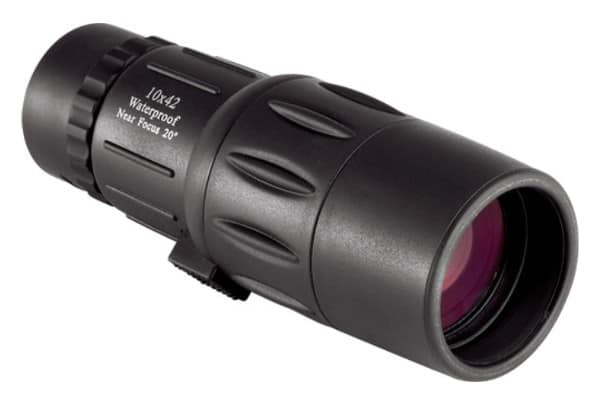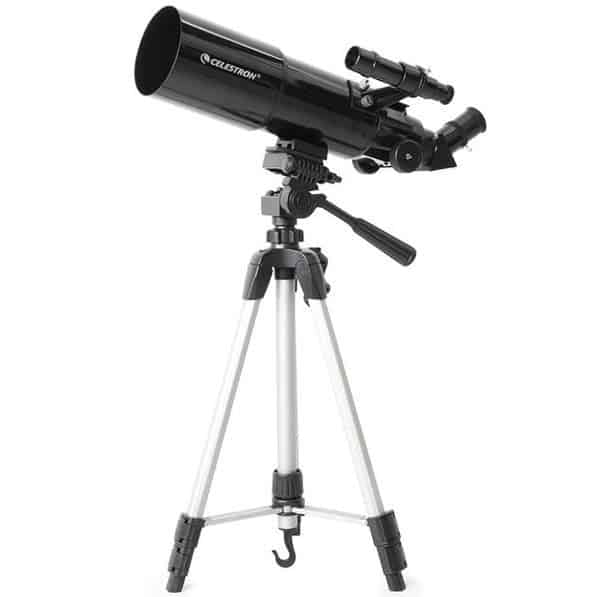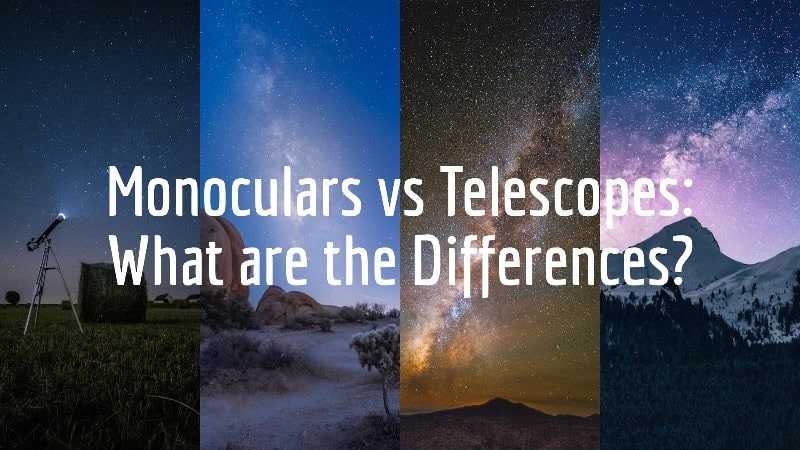Monoculars and telescopes are similar optical devices but are ultimately quite different and suit different purposes.
In this article we investigate the differences between telescopes and monoculars and identify what each is best for.
What is the Difference Between a Telescope and a Monocular?
A telescope is an optical device that uses lenses, mirrors, or a combination of both to provide clear and magnified views of far-off astronomical objects.
A monocular is a small, handheld optical device that uses lenses and is primarily used for terrestrial purposes.

The key differences between monoculars and telescopes are:
- Size and weight: Monoculars are very small and light. They are designed to be used by hand. Telescopes can be a range of sizes and weights but will always be bigger than a monocular and need to be used with a tripod.
- Portability: Given the small size and low weight of a monocular, it is very easy to travel with. They can fit into a pocket and be taken out with little preparation. A telescope will need to be transported with its additional components (like a tripod) and is less portable. You can get travel telescopes that come complete with backpack and all you need in one, but this will always be more weight, bulk and effort than a monocular.
- Aperture: Telescopes have a larger lens diameter which means a higher aperture. This can range from 60mm to 400mm. The higher the aperture the better in terms of providing good, clear views, especially in low light. The aperture of a monocular is limited by its small size and weight and will range from 12mm to 50mm.
- Magnification: Monoculars usually have a low magnification of around 8x or 10x, which is the maximum you would want for handheld use. Telescope magnification is higher but is variable according to the eyepiece used.
- Field of view: Telescopes have a narrower field of view due to the higher magnification. Monoculars have a wider field of view due to the lower magnification. This means that telescopes are much better for astronomy – looking deeper at specific objects in space – but monoculars can be good for stargazing where you are scanning the skies by hand and want to see a wider expanse of the night sky.
- Eyepieces: Telescopes can have different eyepieces fitted that can be bought separately. Monoculars have a single built-in eyepiece that cannot be changed.
- Tripod vs handheld: Due to the size and higher magnification, telescopes need to be used with a tripod. Monoculars are lighter and have a lower magnification that is tailored for handheld use.
- Eye relief: Telescope eyepieces will often have adjustable eye relief, meaning that you can rest your eye against it, rather than hold it a small distance away like you may need to do with a monocular.
- Photography: Most modern telescopes can be used for photography, either with a smartphone adapter or by attaching a camera. The handheld nature of monoculars doesn’t lend itself to photography, although there are some higher power models that come with mini-tripods and smartphone photography adapters (see the Best Monoculars for Astronomy).
- Price: Monoculars are cheaper than telescopes. The smaller size and simplicity means that this will nearly always be the case other than for some very budget telescopes that will be of questionable worth.
Note that there will be exceptions to these, with some monoculars more expensive than some telescopes, or with higher aperture/magnification, etc.
Telescope vs Monocular Pros and Cons
This then translates into the below pros and cons for telescopes vs monoculars.
Monocular Pros and Cons vs Telescopes
The advantages of monoculars are:
- Small, light and very easy to transport and travel with
- Simple to use – just pull it out of your pocket and look through it
- No setup is required
- No additional components or add-ons are needed
- Hardy and weatherproof or waterproof
- Cheap
The disadvantages of monoculars are:
- Limited power and optical capacity for viewing far-off objects, particularly in relation to astronomy and stargazing
- The handheld nature is not suited to photography or astrophotography
Telescope Pros and Cons vs Monoculars
The advantages of telescopes are:
- More powerful and designed specifically for astronomy use
- They have the flexibility to be upgraded with external components. For example, getting better eyepieces, a barlow lens, or a mount for astrophotography, etc.
The disadvantages of telescopes are:
- Much harder to use and master.
- Will require some setup. This may include collimating (adjusting) the mirrors if a reflector or catadioptric telescope.
- Will need to be used with a tripod and mount
- May require a power source if a computerized telescope. This means cables or a battery pack.
- There are extra components to manage and buy like star diagonals, eyepieces, barlow lenses, or focal reducers.
- Can be very heavy and bulky. This can make them hard to transport and travel with but also hard to store at home and time-consuming to set up.
- Expensive. Costing from $100 for the most basic beginner model, to thousands for the most powerful telescopes you can buy.
Monocular vs Telescope for Astronomy
Whilst there are some good, high-powered monoculars for stargazing, telescopes are much better for astronomy.
Telescopes are specifically designed and created for astronomy use and usually come with all you need in one package for that purpose.
With monoculars for astronomy, you are repurposing a device that is designed for terrestrial, daytime use and so will never be as good. Although they can have some advantages, particularly relating to portability.

Monocular vs Telescope FAQs
Is a monocular a telescope?
A monocular is a small, handheld telescope. They are designed primarily for pursuits like bird-watching, hunting or shooting.
Are monocular telescopes good?
Monocular telescopes are good for handheld use and suit bird-watching or shooting, but can be used for stargazing.
Their small size and light weight make them perfect for walking and traveling with.
Can you stargaze with a monocular?
Monoculars can be used for stargazing. Their handheld nature and low magnification is well suited to scanning the night skies. Like low-magnification binoculars, they can work really well for viewing astronomical events like meteor showers.
See the Best Monoculars for Stargazing & Astrophotography.
The limited aperture and handheld nature of monoculars does mean that they are less suited to looking closely at planets or deep sky objects like galaxies. For this, a telescope or pair of astronomy binoculars is much better.
What is the difference between a monocular and binoculars?
A pair of binoculars is actually two monoculars joined together to be used with two eyes, rather than one. They are the same components inside, just doubled with binoculars.
Monoculars then have the advantage of being smaller and lighter, and may suit people with impaired vision in one eye.
Binoculars have the advantage of using both eyes which results in better quality views.
See Monoculars vs Binoculars for more on this.
What is the difference between a monocular and a spotting scope?
Monoculars usually have relatively low magnification and aperture and are designed to be used by hand.
Spotting scopes are more powerful and need to be used with a tripod.
See Spotting Scope vs Monocular for more on this.
Verdict: Monocular vs Telescope
Overall, it depends on what you want to do for whether a telescope or monocular is better for you:
Telescopes:
- Are tailored for astronomy use and usually come with all you need for that purpose.
- They generally have higher magnification and larger aperture. The larger aperture will give you clearer views and the higher magnification will allow you to zoom into planets and other astronomical objects (i.e. astronomy).
- However, high magnification is not good for scanning the skies (i.e. stargazing) as it results in a narrower field of view and so monoculars (or binoculars) can be better for this.
- Are more expensive and need to be used with a tripod.
- Are bigger, bulkier and less easy to travel with or store.
Monoculars:
- Are small, handheld devices that need no extra components.
- They generally have low magnification and can be used by hand. They can therefore be better than telescopes for scanning the skies and watching astronomical events like meteor showers.
- But they generally have lower aperture and so will provide less bright and clear views of objects in the night sky.
- They are small and portable. They can even fit in your pocket.
- Are cheaper than telescopes.
Related articles:




MY DAD SAYS THAT A MONOCULAR IS BETTER. (TELESCOPE IS BETTER)
Thanks Liam!